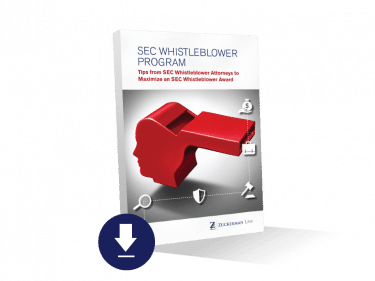On December 5, 2016, the SEC issued an award determination resolving two whistleblowers’ claims based on the same action against the same entities. One whistleblower received an award of $3.5 million to a whistleblower. The second whistleblower received nothing.
The SEC Whistleblower Program has produced results at an increasing rate. In 2016 alone, the SEC issued nearly $57 million in awards. See our column in Forbes: One Billion Reasons Why The SEC Whistleblower-Reward Program Is Effective.
But unfortunately, the second whistleblower is far from alone. The SEC denies more claims than it grants. In this case, the SEC denied the second whistleblower’s claim for two reasons. One of those reasons was that the second whistleblower’s claim was filed late.
On appeal, the second whistleblower argued that the process for claiming an award was unclear and that the SEC should ensure whistleblowers know how to make a claim. The SEC disagreed, reasoning that the SEC gave “constructive notice” through its Notice of Covered Action and the relevant rules.
The long journey to obtaining a whistleblower award can be complex, and there are many pitfalls along the way for the inexperienced and unsuspecting. Whistleblower attorneys can help whistleblowers:
- Spot these issues;
- Submit effective claims to the SEC;
- Increase award percentages; and
- Properly claim an award
Contact the experienced SEC whistleblower lawyers at Zuckerman Law for a free, confidential consultation at 202-262-8959.
Providing Information That “Leads To” A Successful Enforcement Action
The SEC also denied the second whistleblower’s claim because the whistleblower “did not provide information that led to the successful enforcement of the Covered Action.” According to the SEC, information will only “lead to” an enforcement action if it caused the staff to:
- Open an investigation;
- Reopen an investigation;
- Inquire into different conduct as part of a current investigation; or
- If the information significantly contributed to the success of conduct that was already under examination or investigation.
In this case, the first whistleblower submitted specific and credible information that led to a successful SEC enforcement action. In contrast, the second whistleblower made multiple disclosures that – with one exception – failed to pass even the first level of SEC scrutiny.
Based on a review of the SEC Whistleblower Office’s final orders, information not leading to a successful enforcement action is the top reason why awards are denied. Since the whistleblower program’s inception, the SEC has denied more than 100 whistleblower award claims for this reason.
Successful whistleblowers give the SEC specific and credible information about violations of securities laws. But the SEC receives thousands of tips per year and has limited resources. Whistleblower submissions need to grab the SEC’s attention and stand out among the other submissions.
Experienced lawyers can help whistleblowers stand out by framing their credible information in a way that will be more likely to get the SEC’s attention. In addition, as a practical matter, whistleblowers are more likely to get their information reviewed and acted upon when they have a lawyer advocating for them. Finally, lawyers can help whistleblowers analyze the significant factors that could increase or decrease an award prior to submitting the claim. This ensures that if the SEC has a successful enforcement action against the named entity or individual, the whistleblower is well-positioned to receive the highest award percentage possible.
Notices of Covered Actions and Award Applications
As discussed above, the SEC denied the second whistleblower an award because the award application was submitted after the deadline had passed. According to Rule 21F-10(a)(1), the SEC will publish a “Notice of Covered Action” on its website when an action results in monetary sanctions totaling more than $1 million.
It is the whistleblower’s responsibility to monitor these notices for actions that may be related to the whistleblower’s tip. The whistleblower then has 90 calendar days from the date of the Notice of Covered Action to submit an award application. Any award application not received by the deadline “will be barred,” and the whistleblower will no longer be eligible for an award.
Again, many pitfalls lie along the way to a whistleblower award for the inexperienced and unsuspecting. The first whistleblower, or the whistleblower’s attorney, tracked the covered actions and applied for an award within 90 days of the notice. The second whistleblower apparently did not track the notices and missed the opportunity to apply for an award. If the second whistleblower’s information actually had led to the successful enforcement action, this delay would have cost the whistleblower an award worth potentially millions.
Protections for SEC Whistleblowers
Click here to learn more about anti-retaliation protections for SEC whistleblowers under the Dodd-Frank Act and Sarbanes-Oxley Act.
How to Qualify for an SEC Whistleblower Award
Experienced and Effective SEC Whistleblower Bounty Lawyers
Before submitting a tip to the SEC, whistleblowers should ensure that they are in the best position to receive an award.
The experienced whistleblower lawyers at Zuckerman Law have substantial experience representing whistleblowers under the SEC’s Whistleblower Program and under other whistleblower reward and whistleblower protection laws. To schedule a free consultation, click here or call us at 202-262-8959.
Download our free ebook about the SEC Whistleblower Program:









